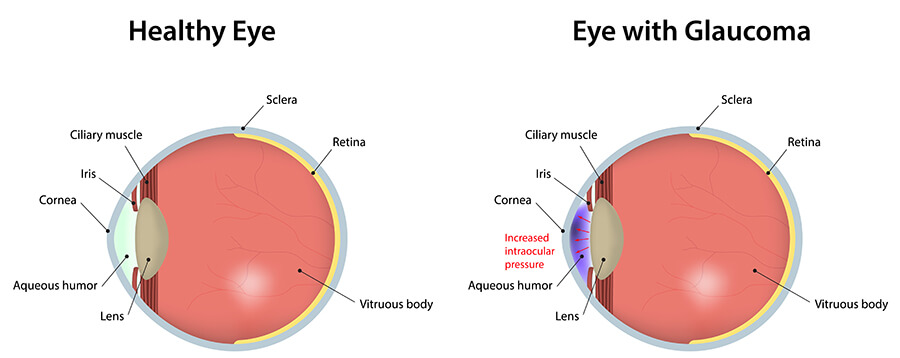What Is Glaucoma?
Glaucoma is a group of diseases characterized by abnormal fluid build-up in the eye, which leads to elevated intraocular pressure (IOP). If left untreated, chronically high IOP can damage the optic nerve, which transmits visual information from the eye to the brain. Depending on the extent of damage, this process can cause partial to complete loss of vision. Due to the fact that glaucoma progresses gradually and usually does not cause any discomfort, it is important to receive regular eye exams to monitor your eyes’ IOP. Early detection of glaucoma is vital to stop the progression of this disease and to preserve your eyesight.

While most often glaucoma progresses without any noticeable signs, acute glaucoma can cause sudden onset of several distressing symptoms, including:
- Blurry vision
- Haloes around lights
- Intense eye pain
- Nausea and vomiting
If you experience any of these symptoms, you need to visit the emergency room immediately to prevent permanent loss of vision. However, it is best to consistently monitor your eyes’ IOP to avoid this dangerous stage of glaucoma. Please schedule a consultation with Dr. Lippman who can perform a thorough examination and recommend the most suitable treatment.
Who Is at Risk for Glaucoma?
While glaucoma is typically associated with older people, it can affect anyone, including newborns. This is why it is important to receive regular eye exams to ensure that your eyes’ IOP is normal. Certain groups of patients are at increased risk for developing glaucoma. If you belong to one of these groups, you should talk to your doctor about the steps you can take to prevent damage from glaucoma:
- Family history of glaucoma
- African ancestry
- Severe myopia (nearsightedness)
- Diabetes
- Long-term use of steroids
- Eye injury
Schedule Evaluation
Click the button below to schedule your evaluation today!
Glaucoma Treatment
Depending on the type and degree of glaucoma, treatment may include medication (eye drops), glaucoma surgery or laser therapy. Typically, eye drops are tried first to control the elevated intraocular pressure of glaucoma. However, surgery might be required if the patient’s glaucoma is more pronounced. An exciting recent development in glaucoma treatment is the SLT therapy. This method uses a special laser to reduce the pressure in the eye — the key to halting the progress of glaucoma. The laser’s energy is precisely targeted, affecting only select cells and leaving the surrounding tissue intact. As a result, the SLT procedure is usually painless, and the patient can resume regular activities immediately after treatment.
Combining Vision Correction Treatments
Dr. Lippman specializes in a variety of advanced treatments to provide his patients with the best possible vision correction results. Certain glaucoma patients also develop cataracts, which Dr. Lippman can treat by performing combined glaucoma and cataract surgery.
